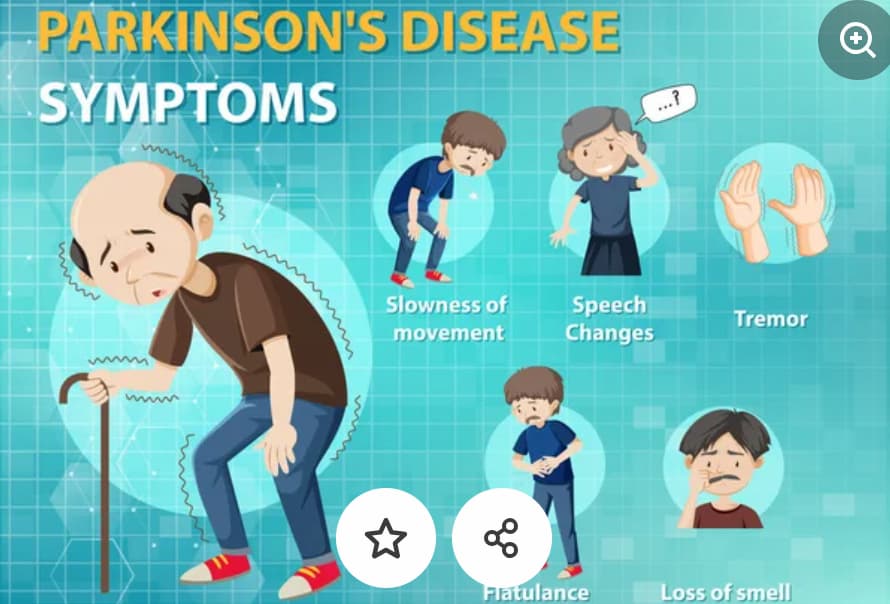Parkinson’s disease ranks as the second most widespread neurodegenerative ailment. It mostly affects over 1% of 60+ adults all over the world. Besides physical symptoms, such as movement disorders, there are also Parkinson’s personality changes. Understanding these impacts on mental health and emotional well-being is important to take proper care and support to individuals with Parkinson’s.
Understanding Parkinson’s Disease
Researchers believe that Parkinson’s occurs due to genetic and environmental factors. Emotional trauma and Parkinson’s disease are closely connected. Life stress may contribute to the development of depression and then the disease itself.
Does Parkinson’s affect your mind? It sure does! Here is the physiology of Parkinson’s disease. Nerve cells in the basal ganglia, a part of the brain that manages movement, are damaged or lost. This way, neurons produce less dopamine, which causes
- Tremors and shaking
- Rigid muscles
- Slow movements
- Loss of automatic movements
- Impaired balance and coordination
- Trouble peeing and constipation
- Dizziness and blurred vision
- Excessive sweating
- Excessive production of saliva
- Swallowing and chewing problems
- Skin problems
- Parkinsonian faces or limited expressions
- Sleeping problems
Parkinson’s personality changes affect mental health and emotional well-being, leading to
- Anxiety and depression
- Emotional changes, also known as Parkinson’s mood swings
- Memory and thinking problems
- Speaking problems

Parkinson’s Disease Mental Symptoms
Adults with Parkinson’s symptoms experience various mental health troubles alongside physical ones. There is a mutual cause-and-effect relationship between Parkinson’s disease and stress. Both the disease and mental issues lead to Parkinson’s personality changes and impaired quality of life for patients.
Depression
Depression refers to feelings of persistent sadness, loss of hope, interest, or pleasure in activities that used to bring joy. People with Parkinson’s disease may experience depression while coping with chronic symptoms and physical limitations.
Anxiety
Anxiety is a feeling of excessive worry, nervousness, or fear about future events or situations. People with Parkinson’s disease might feel anxious. They are uncertain about their health and worry about changes in their abilities and the disease progression.
Apathy
Apathy is a lack of motivation, interest, or enthusiasm for activities and social interactions. It also refers to a general disinterest in life and a lack of emotional engagement.
Psychosis
Psychosis involves a loss of contact with reality, leading to hallucinations. This includes seeing or hearing unreal things and false beliefs or misinterpretations of reality.
Cognitive Impairment
Cognitive impairment refers to trouble remembering, thinking, learning new things, concentrating, or making decisions that affect their everyday lives.
Depression and Parkinson’s Disease
Depression is one of the most common psychiatric symptoms of Parkinson’s disease, affecting up to 40% of patients. Quite often, it goes undiagnosed and untreated, which results in Parkinson’s personality changes. Also, the combination of physical and mental limitations contributes to the development of depression.
Common symptoms in this case include:
- Fatigue and weakness
- Sadness and helplessness
- Lack of interest and drive
- State of unease or dissatisfaction
- Irritability
- A feeling of despair or lack of hope.
Diagnosing can be difficult because the symptoms overlap with those of the disorder. Yet, early identification and management of Parkinson’s disease mental symptoms are important for optimal care.
Anxiety and Parkinson’s Disease
Anxiety disorders are quite common in adults with Parkinson’s disease. Up to 55% of patients experience various anxiety disorders, such as generalized anxiety disorder (GAD), anxiety attacks, social anxiety disorder, and obsessive-compulsive disorder (OCD).
The uncertainty about disease progression, anticipation of physical troubles, and independence loss trigger fear and worries. Treating anxiety with medication, therapy, and stress-management techniques may improve well-being and coping skills.
Get a free online consultation
Please, contact our medical advisor to discuss your health condition with a specialist in regenerative medicine. You can also leave your contact details for a callback. It is free and confidential.
Apathy and Parkinson’s Disease
Apathy is often overlooked in disease care and coexists with depression. Social and behavioral apathy is prevalent in people with Parkinson’s disease.
Apathy leads to a lack of motivation, interest in new activities, and a desire to see other people. Therapies focusing on increasing stimulation, setting achievable goals, and managing depression help ease apathy symptoms.
Psychosis and Parkinson’s Disease
Psychosis usually occurs in the latter stages of Parkinson’s disease. Common symptoms are visual hallucinations, sensory issues such as illusions, and paranoid delusions. These symptoms typically come back or worsen as time goes on.
Psychosis results from the use of certain medications, delirium, and dementia. This condition increases the risk of morbidity and mortality. Decreasing the dosage of anti-Parkinson disease drugs may ease these symptoms, but worsen physical ones.
Non-pharmacological methods, such as reality orientation and caregiver help, are also important in managing psychosis.
Cognitive Impairment and Parkinson’s Disease
Cognitive impairment contributes greatly to Parkinson’s disease personality changes. There may be mild cognitive impairment in 20-50% of patients that doesn’t affect daily life or work much. Up to 40% of Parkinson’s disease patients develop dementia, which significantly impairs daily life.
Cognitive impairment makes people feel distracted and disorganized. They find it difficult to plan, focus, and accomplish tasks. These symptoms impact daily functioning and develop emotional distress.
Parkinson’s Mood Swings
Mood swings are common in people with Parkinson’s disease and can fluctuate throughout the day. Up to 50% of people suffer from depression and anxiety, 40% for apathy, and up to 30% for Impulse Control Disorders (ICB).
Parkinson’s Disease and anger outbursts are also strongly linked, which affects not only patients but also their caregivers. Learning the disease triggers and using relaxation techniques and mindfulness can help calm mood swings.

Managing Mental Health and Emotional Wellbeing With Parkinson’s Disease
Medications to manage symptoms of depression, anxiety, and psychosis
For depression in Parkinson’s Disease, cognitive-behavioral therapy (CBT) is often the first-line choice due to its effectiveness and minor side effects. If CBT alone isn’t enough, doctors may prescribe antidepressants like selective serotonin reuptake inhibitors.
Pimavanserin (Nuplazid) is the only medication approved to treat psychosis symptoms in patients with Parkinson’s disease.
Emotional support and counseling play a significant role in managing Parkinson’s disease. Patients and their families find support and guidance from mental health professionals and learn how to deal with the emotional and psychological effects of the condition.
Specialists can also assess changes in mood and cognitive functions, and adjust treatment.
Researchers believe that cognitive-behavioral therapy (CBT) may be effective in improving anxiety and depression symptoms and sleep quality in people with Parkinson’s disease.
Exercise and physical activity to improve mood and reduce stress
Physical activity, including yoga, mindful walking, and swimming are highly beneficial. Exercises help improve mood, foster relaxation, support balance, and mobility. Aerobic activity and stretching may also support cognitive skills in Parkinson’s patients.
Support groups or peer counseling to connect with others who have the condition
Support groups and counseling programs help interact with people with the same mental and physical problems. There, people may support each other and share experiences. Also, compared to medications, this type of therapy has no side effects and can be a long-term treatment.
Stress-reduction techniques, such as meditation or relaxation exercises
Various methods can help individuals manage stress, reduce anxiety, and reduce other symptoms’ severity in people with Parkinson’s Disease. Among them are mindfulness meditation, deep breathing exercises, and progressive muscle relaxation techniques. Research shows that it is especially effective in managing anxiety and depressed mood.
Stem cell therapy for Parkinson’s disease
Using stem cell therapy with mesenchymal stem cells (MSCs) for Parkinson’s disease relies on the ability of MSCs to turn into the same kind of brain cells that PD patients are missing. They’ve shown they can restore the activity of certain brain cells that are important for movement.
Many patients have had an improvement in speech, the reduction of tremors, and disease progression halt. Stem cell therapy might also help by reducing inflammation in the brain, supporting nerve cells, and encouraging the growth of new blood vessels.
Discover more about the innovative treatment options for Parkinson’s disease involving stem cells in this article.
Contact us
Get a free online consultation to learn about the expected results of stem cell therapy for your case, what is the cost of the treatment, and its duration.
List of References:
Zafar S, Yaddanapudi SS. Parkinson Disease. [Updated 2023 Aug 7]. In: StatPearls [Internet]. Treasure Island (FL): StatPearls Publishing; 2024 Jan-. Available from: https://www.ncbi.nlm.nih.gov/books/NBK470193. (Accessed 21/03/24)
Parkinson’s Disease: Causes, Symptoms, and Treatments. Available from: https://www.nia.nih.gov/health/parkinsons-disease/parkinsons-disease-causes-symptoms-and-treatments. (Accessed 21/03/24)
Dallé E, Mabandla MV. Early Life Stress, Depression And Parkinson’s Disease: A New Approach. Mol Brain. 2018 Mar 19;11(1):18. doi: 10.1186/s13041-018-0356-9. PMID: 29551090; PMCID: PMC5858138.
Han JW, Ahn YD, Kim WS, Shin CM, Jeong SJ, Song YS, Bae YJ, Kim JM. Psychiatric Manifestation in Patients with Parkinson’s Disease. J Korean Med Sci. 2018 Nov 1;33(47):e300. doi: 10.3346/jkms.2018.33.e300. PMID: 30450025; PMCID: PMC6236081.
Laux G. Parkinson and depression: review and outlook. J Neural Transm (Vienna). 2022 Jun;129(5-6):601-608. doi: 10.1007/s00702-021-02456-3. Epub 2022 Jan 4. PMID: 34982207.
Broen, M.P.G., Narayen, N.E., Kuijf, M.L., Dissanayaka, N.N.W. and Leentjens, A.F.G. (2016), Prevalence of anxiety in Parkinson’s disease: A systematic review and meta-analysis. Mov Disord., 31: 1125-1133. https://doi.org/10.1002/mds.26643
Thompson N, MacAskill M, Pascoe M, Anderson T, Heron CL. Dimensions of apathy in Parkinson’s disease. Brain Behav. 2023 Jun;13(6):e2862. doi: 10.1002/brb3.2862. Epub 2023 May 18. PMID: 37203279; PMCID: PMC10275530.
Samudra N, Patel N, Womack KB, Khemani P, Chitnis S. Psychosis in Parkinson Disease: A Review of Etiology, Phenomenology, and Management. Drugs Aging. 2016 Dec;33(12):855-863. doi: 10.1007/s40266-016-0416-8. PMID: 27830568; PMCID: PMC6760850.
Cognitive Changes. Written by Jennifer G. Goldman, MD, MS, Assistant Professor, Section of Parkinson Disease and Movement Disorders, Department of Neurological Sciences at Rush University Medical Center, Chicago, IL. Available from: https://www.apdaparkinson.org/what-is-parkinsons/symptoms/cognitive-changes. (Accessed 21/03/24)
Ricciardi, L., Apps, M. & Little, S. Uncovering the neurophysiology of mood, motivation and behavioral symptoms in Parkinson’s disease through intracranial recordings. npj Parkinsons Dis. 9, 136 (2023). https://doi.org/10.1038/s41531-023-00567-0
Tripathi A, Gupta PK, Bansal T. Management of Psychiatric Disorders in Patients with Parkinson’s Diseases. Indian J Psychiatry. 2022 Mar;64(Suppl 2):S330-S343. doi: 10.4103/indianjpsychiatry.indianjpsychiatry_29_22. Epub 2022 Mar 23. PMID: 35602377; PMCID: PMC9122177.
Macchi ZA, Seshadri S, Ayele R, Bock M, Long J, Coats H, Miyasaki J, Pantilat SZ, Katz M, Santos EJ, Sillau SH, Lum HD, Kluger BM. Aggression Towards Caregivers in Parkinson’s Disease and Related Disorders: A Mixed Methods Study. Mov Disord Clin Pract. 2022 Sep 7;9(7):920-931. doi: 10.1002/mdc3.13555. PMID: 36247911; PMCID: PMC9547131.
Zarotti N, Eccles FJR, Foley JA, Paget A, Gunn S, Leroi I, Simpson J. Psychological interventions for people with Parkinson’s disease in the early 2020s: Where do we stand? Psychol Psychother. 2021 Sep;94(3):760-797. doi: 10.1111/papt.12321. Epub 2020 Nov 11. PMID: 33174688.
van der Heide A, Speckens AEM, Meinders MJ, Rosenthal LS, Bloem BR, Helmich RC. Stress and mindfulness in Parkinson’s disease – a survey in 5000 patients. NPJ Parkinsons Dis. 2021 Jan 18;7(1):7. doi: 10.1038/s41531-020-00152-9. PMID: 33462213; PMCID: PMC7813889.
Medical Advisor, Swiss Medica doctor






